Tony Jones | |
|---|---|
 Jones in December 2012 | |
| Alma mater | Dartmouth College |
| Occupations |
|
| Spouses |
|
Tony Jones is a leader in the Christian emerging church movement, a theologian, and an author.
Tony Jones | |
|---|---|
 Jones in December 2012 | |
| Alma mater | Dartmouth College |
| Occupations |
|
| Spouses |
|
Tony Jones is a leader in the Christian emerging church movement, a theologian, and an author.
Jones grew up near Edina, Minnesota, and graduated from Edina High School in 1990. He later graduated from Dartmouth College and attended both Fuller Theological Seminary and Princeton University, pursuing a doctorate from the latter. [1] Jones divorced his first wife, Julie McMahon, in 2009. In July 2011, [2] Jones wedded Courtney Perry in a religious marriage, but not legally by the laws of Minnesota or the United States in solidarity with non-heterosexual couples who could not wed: "It was for this reason that Courtney and I decided to forego legal marriage until such time as our GLBT friends were afforded all of the benefits that accrue with a legal marriage." Twenty-eight months later, they were scheduled to legally wed at the Minneapolis Sculpture Garden on November 11, 2013. [3]
While attending Fuller Theological, Jones returned to his childhood church—Colonial Church in Edina—and worked there as a youth pastor for seven years before leaving for his doctoral work at Princeton. [1] As a spokesperson with the emerging church movement, Jones was invited by a similar Jewish organization, Synagogue 3000, to speak at their 2006 meeting. [4] On October 31, 2008, Jones's leadership position of the emerging-church organization Emergent Village was eliminated. [5] Jones began attending Solomon's Porch in 2005—a church in South Minneapolis, and by April 2012, he was the group's "theologian-in-residence" and helped run workshops about connecting with congregants with 21st-century means. At the same time, Jones was an adjunct professor with Fuller. [1]
In 2006, Jones was a contributor to Christianity Today magazine. [6] Jones is the author of the non-fiction book, The New Christians (2008). [7] Religion Dispatches ' Peter Laarman was pleasantly surprised by Jones' 2012 non-fiction book A Better Atonement; Laarman called Jones a celebrity in the emerging church movement, and recommended the book for "anyone who’s even considering whether 'that old-time religion' isn’t quite good enough any more." [8] Jones also turned his doctoral dissertation into a book—The Church Is Flat—about the emerging church movement. [1] In 2012, Jones also published the controversial mobile app Ordain Thyself, which offers a variety of religions in which the user can virtually ordain themselves; the app has options for Catholicism, Hasidic Judaism, Hinduism, and Klingon religions, each of which instructs the user on their new belief system and provides photo filters to apply the appropriate vestments to personal photos. [9] [10] Ordain Thyself retailed for US$0.99(equivalent to $1.31 in 2023). [11] In 2020, Associated Press Sports Editors named a Star Tribune publication—"Odyssey ahead in the BWCA", co-authored by Jones—the organization's number-one sports "project" of 2019. [12]
Tracing a North Woods border route of water and land that has transported people of every ilk for centuries, a group's canoe trip in early June through the eastern lakes of the Boundary Waters Canoe Area Wilderness was every bit a trip into the past. It also informed the present and was classic adventure. Over the next five weeks, we'll tell of the trip on a historic water trail, of its joys and challenges, and of a new appreciation, for a father and son, of the BWCA's diverse beauty. Join the adventure.
Nondenominational Christianity consists of churches, and individual Christians, which typically distance themselves from the confessionalism or creedalism of other Christian communities by not formally aligning with a specific Christian denomination. According to Arizona Christian University's Cultural Research Center, nondenominational faith leaders typically maintain a biblical worldview at higher percentages than those of other Christian groups.
A Christian denomination is a distinct religious body within Christianity that comprises all church congregations of the same kind, identifiable by traits such as a name, particular history, organization, leadership, theological doctrine, worship style and, sometimes, a founder. It is a secular and neutral term, generally used to denote any established Christian church. Unlike a cult or sect, a denomination is usually seen as part of the Christian religious mainstream. Most Christian denominations refer to themselves as churches, whereas some newer ones tend to interchangeably use the terms churches, assemblies, fellowships, etc. Divisions between one group and another are defined by authority and doctrine; issues such as the nature of Jesus, the authority of apostolic succession, biblical hermeneutics, theology, ecclesiology, eschatology, and papal primacy may separate one denomination from another. Groups of denominations—often sharing broadly similar beliefs, practices, and historical ties—are sometimes known as "branches of Christianity". These branches differ in many ways, especially through differences in practices and belief.
Michael Scott Horton is the J. Gresham Machen Professor of Systematic Theology and Apologetics at Westminster Seminary California. He is a scholar and theologian, having written and edited more than forty books and contributed to various encyclopedias, including the Oxford Handbook of Reformed Theology and Brill’s Encyclopedia of Christianity.
The emerging church, sometimes wrongly equated with the "emergent movement" or "emergent conversation", is a Christian movement of the late 20th and early 21st century. Emerging churches can be found around the globe, predominantly in North America, Western Europe, Australia, New Zealand, and Africa. Members come from a number of Christian traditions. Some attend local independent churches or house churches while others worship in traditional Christian denominations. The emerging church favors the use of simple story and narrative. Members of the movement often place a high value on good works or social activism, including missional living. Proponents of the movement believe it transcends labels such as "conservative" and "liberal"; it is sometimes called a "conversation" to emphasize its developing and decentralized nature, its range of standpoints, and commitment to dialogue. Participants seek to live their faith in what they believe to be a "postmodern" society. Disillusionment with the organized and institutional church has led participants to support the deconstruction of modern Christian worship and evangelism, and the nature of modern Christian community.
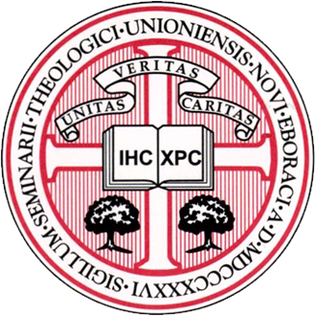
Union Theological Seminary in the City of New York is a private ecumenical liberal Christian seminary in Morningside Heights, Manhattan, affiliated with Columbia University. Columbia University lists UTS among its affiliate schools, alongside with Barnard College and Teachers College. Since 1928, the seminary has served as Columbia's constituent faculty of theology. In 1964, UTS also established an affiliation with the neighboring Jewish Theological Seminary of America. Despite its affiliation with Columbia University, UTS is an independent institution with its own administration and Board of Trustees. UTS confers the following degrees: Master of Divinity (MDiv), Master of Divinity & Social Work dual degree (MDSW), Master of Arts in religion (MAR), Master of Arts in Social Justice (MASJ), Master of Sacred Theology (STM), Doctor of Ministry (DMin), and Doctor of Philosophy (PhD).
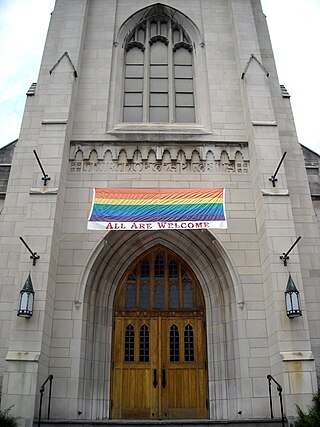
Progressive Christianity represents a postmodern theological approach, which developed out of the liberal Christianity of the modern era, itself rooted in the Enlightenment's thinking. Progressive Christianity is a postliberal theological movement within Christianity that, in the words of Reverend Roger Wolsey, "seeks to reform the faith via the insights of post-modernism and a reclaiming of the truth beyond the verifiable historicity and factuality of the passages in the Bible by affirming the truths within the stories that may not have actually happened."
Paleo-orthodoxy is a Protestant Christian theological movement in the United States which emerged in the late 20th and early 21st centuries and which focuses on the consensual understanding of the faith among the ecumenical councils and Church Fathers. While it understands this consensus of the Church Fathers as orthodoxy proper, it calls itself paleo-orthodoxy to distinguish itself from neo-orthodoxy, a movement that was influential among Protestant churches in the mid-20th century.
Doug Pagitt is a progressive evangelical pastor and author associated with the emerging church movement.
Postliberal theology is a Christian theological movement that focuses on a narrative presentation of the Christian faith as regulative for the development of a coherent systematic theology. Thus, Christianity is an overarching story, with its own embedded culture, grammar, and practices, which can be understood only with reference to Christianity's own internal logic.
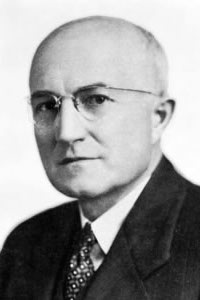
Kenneth Scott Latourette was an American Baptist minister and historian, specialized in Chinese studies, Japanese studies, and the history of Christianity. His formative experiences as a Christian missionary and educator in early 20th-century Imperial China shaped his life's work. Although he did not learn the Chinese language, he became known for his study of the history of China, the history of Japan, his magisterial scholarly surveys on world Christianity, and of American relations with East Asia.

Brian D. McLaren is an author, speaker, activist, public theologian and was a leading figure in the emerging church movement. McLaren is often associated with postmodern Christianity.
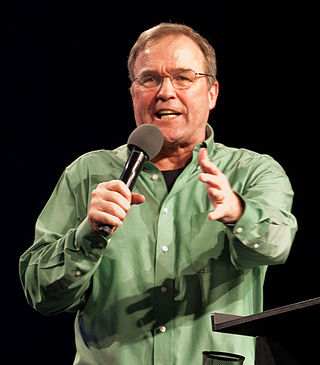
Michael Leroy Bickle is an American evangelical leader who was the founder of the International House of Prayer (IHOPKC). Once the leader of IHOPKC, Bickle oversaw several ministries and a Bible school. Bickle has written a number of books and served as the pastor of multiple churches.
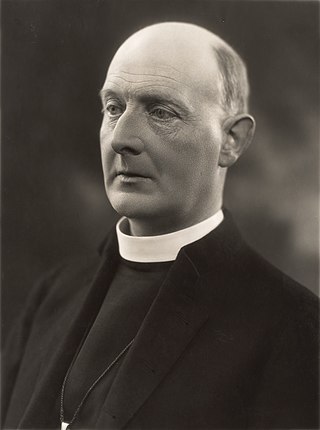
Cyril Forster Garbett was an Anglican bishop and author. He was successively Bishop of Southwark (1919–32), Bishop of Winchester (1932–42) and Archbishop of York (1942–55).

Timothy James Keller was an American Calvinist pastor, preacher, theologian, and Christian apologist. He was the chairman and co-founder of Redeemer City to City, which trains pastors for service around the world. He was also the founding pastor of Redeemer Presbyterian Church in New York City and the author of The New York Times bestselling books The Prodigal God: Recovering the Heart of the Christian Faith (2008), Prayer: Experiencing Awe and Intimacy with God (2014), and The Reason for God: Belief in an Age of Skepticism (2008). The prequel for the latter is Making Sense of GOD: An Invitation to the Skeptical (2016).
African theology is Christian theology from the perspective of the African cultural context. It should be distinguished from black theology, which originated from the American and South African context and is more closely aligned with liberation theology. Although there are ancient Christian traditions on the African continent, during the modern period Christianity in Africa was significantly influenced by western forms of Christianity brought about by European colonization.
The Convergence Movement, also known as the Ancient-Future Faith, whose foundation is primarily attributed to Robert E. Webber in 1985, is an ecumenical movement. Developed as an effort among evangelical, charismatic and Pentecostal, and liturgical Christians and denominations blending their forms of worship, the movement has been defined for its predominant use of the Anglican tradition's Book of Common Prayer; use from additional liturgical sources common to Lutheranism, Eastern Orthodoxy, and Catholicism have also been employed.

A Christian music festival is a music festival held by the Christian community, in support of performers of Christian music. The festivals are characterized by more than just music; many feature motivational speakers and evangelists, and include seminars on Christian spiritual and missions topics, service, and evangelism. They are often viewed as evangelical tools, and small festivals can draw 10 times the crowd of traditional revival meetings. While the central theme of a Christian festival is Jesus Christ, the core appeal of a Christian music festival remains the artists and their music. Critics point out that the dichotomy of business and religious interests can be problematic for Christian festivals. In similar ways as the Christian music industry in general, festivals can be drawn away from their central theme and gravitate toward commercialization and mainstream acts in an attempt to draw crowds.

Protestantism is a branch of Christianity that emphasizes justification by God through faith alone, the teaching that salvation comes by unmerited divine grace, the priesthood of all believers, and the Bible as the sole infallible source of authority for Christian faith and practice. The five solae summarize the basic theological beliefs of mainstream Protestantism.
Jesuism or Jesusism is a belief system considering itself to be the true representation of the teachings of Jesus and contrasts itself from the teachings of mainstream Christianity. In particular, the term is often contrasted with Pauline Christianity and the mainstream church dogma of Nicene Christianity.
Besides his work in social media, Jones is the theologian-in-residence at Solomon's Porch, an author, and the former national coordinator of Emergent Village.
Apparently Christians aren't the only ones feeling the urge to emerge.
Leaders hope decentralizing power will revitalize the movement.
In part 2 of his post, Tony Jones addresses emerging church critic extraordinaire Chuck Colson. Colson sees the Emergent conversation as a threat to traditional Christian understandings of the 'truth.' Jones responds by discussing the interdependence of truth and community - the essence of the Emergent Village conversation.
The former Emergent coordinator blogs about his views on faith and sexuality.
Ever wonder what it's like to become an ordained priest, rabbi, or swami?